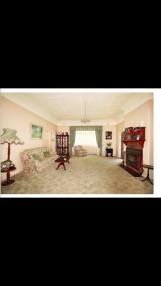My Nan was born in 1928, making her 87 present day. Her experiences, perspectives and attitudes towards the world is vastly different to mine, due to our experiences and context. At a very young age her father died in one of the first car accidents in Nowra, she believed this shaped the way in which she viewed television, as the announcement of his death was broadcasted all over the Illwarrra news for months. She felt it was an embarrassment to her father to have his death so publicly broadcasted, and grew a resentment to how news is broadcasted in the present day. She believes it’s for entertainment, for ‘busy beaks’ instead of informative information for the public.
“I felt like it was a spectacle for the whole state to gawk and whisper about… if it was simply to inform the public of road dangers they should have let him remain anonymous to preserve his reputation.”
This therefore influenced how she orientated the rooms in her own home. The floor plan was centred around the drawing room, library and a singular dining room as the ‘centre pieces’ of her home, rather than a television room. She felt this is what made her home, more of a home, having only a single small television in the kitchen for her husband to watch the football on, and for myself to watch morning cartoons and the 6pm Simpsons. This disdain towards television also mean that colour Tv wasn’t introduced into the family until my mother bought them one as a wedding anniversary gift. The same large box television sat in the back of the library, with a playstaton 1 loosely plugged into it collecting dust, for my brother on the rare occasion that he visited. However with the national switch to digital television, my Nan isn’t even sure it still gets reception.
The concept of an unwanted television, and an individual who has little to no interest in watching one amazes myself. As a young child I always questioned why Nan never wanted to watch movies, or play Who Wants To Be A Millionaire, screaming answers at the screen taking triumphant moments when your answer was correct, but as I get older I understand more. For some television is an escape, a thing to lye in front of and be entertained. “Zombies!” Nan would mutter every time my brother and I sat motionlessly for hours watching re-run after re-run of episodes only emerging to run to the bathroom in add breaks. She would throw books at us, point to the outdoors, tell us go to milk a cow or chase the sheep, anything except wasting our youth in front of a screen.
For her Television seemed a useless entity, filled with ads and crappy shows, whilst outside was where “Young adults build character” you could learn something. It frustrated her that we would prefer to be inside, where it was warm and at arms length of the fridge, and it wasn’t until she said this, that I realised she was right. The home was on a large farm, there was bush, dirt bikes, farm animals and a hundred things to do, but instead we wasted it. After her husband died she sold the farm, sold the quad bikes, and moved to an apartment. I regret the days I could have done something with, I regret not learning how to fix the tractor, or sheer a sheep even how to milk a cow on my own.
These were experiences I robbed myself of, and will never be able to rectify them.




